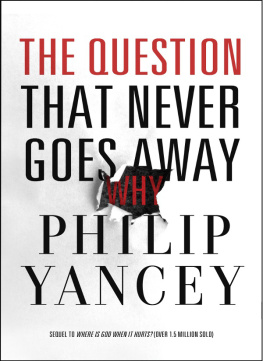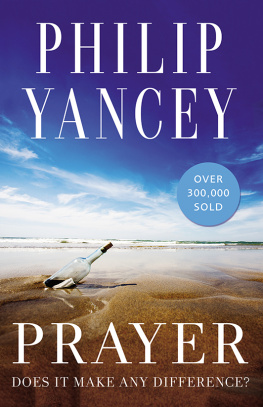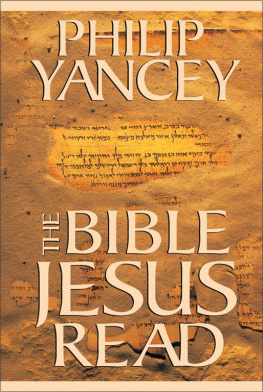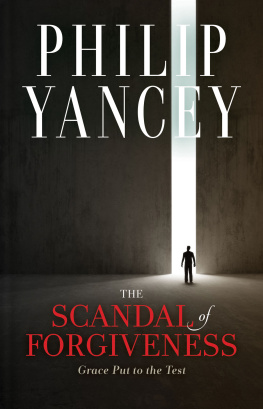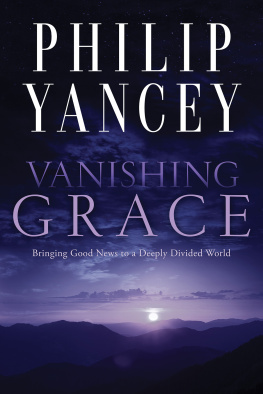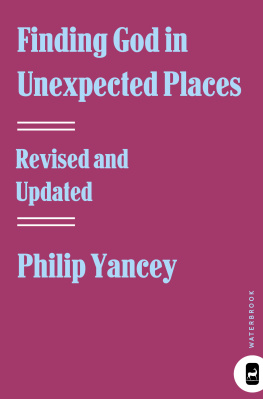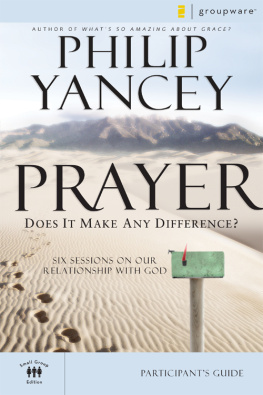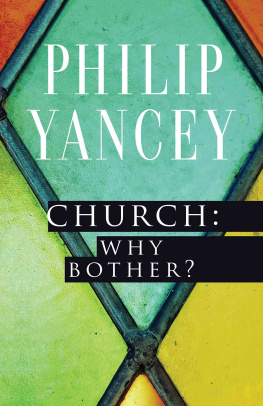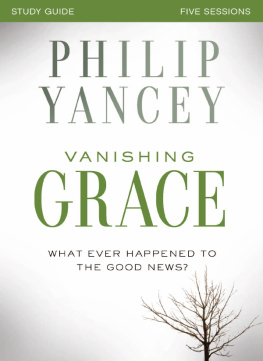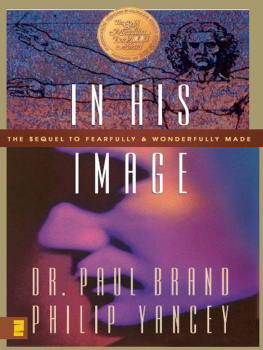
ZONDERVAN
The Question That Never Goes Away
Copyright 2014 by Philip Yancey and SCCT
ePub Edition December 2013: ISBN 978-0-310-33983-0
Requests for information should be addressed to:
Zondervan, 3900 Sparks Dr. SE
Grand Rapids, Michigan 49546
Library of Congress Cataloging-in-Publication Data
Yancey, Philip.
The question that never goes away : what is God up to or not in a world of such tragedy and pain? / Philip Yancey. 1st [edition].
pages cm
Includes bibliographical references and index.
ISBN 978-0-310-33982-3 (hardcover : alk. paper)
1. Disasters Religious aspects Christianity. 2. Providence and government of God Christianity. 3. Consolation. 4. Suffering Religious aspects Christianity. I. Title.
BT135.Y36 2013
248.86 dc23
2013030736
All Scripture quotations, unless otherwise indicated, are taken from The Holy Bible, New International Version, NIV. Copyright 1973, 1978, 1984, 2011 by Biblica, Inc. Used by permission. All rights reserved worldwide.
Any Internet addresses (websites, blogs, etc.) and telephone numbers in this book are offered as a resource. They are not intended in any way to be or imply an endorsement by Zondervan, nor does Zondervan vouch for the content of these sites and numbers for the life of this book.
All rights reserved. No part of this publication may be reproduced, stored in a retrieval system, or transmitted in any form or by any means electronic, mechanical, photocopy, recording, or any other except for brief quotations in printed reviews, without the prior permission of the publisher.
Published in partnership with Creative Trust Digital.
Cover design: Dual Identity
Interior photography: Shutterstock
Interior design: Beth Shagene
Printed in the United States of America
13 14 15 16 17 18 /DCI/ 16 15 14 13 12 11 10 9 8 7 6 5 4 3 2 1
My heart did heave, and there came forth, O God! By that I knew that thou wast in the grief....
George Herbert, Affliction (III)
Contents
M y father contracted polio just before my first birthday. Paralyzed from the neck down, he lay immobile in a noisy iron lung machine that helped him breathe. My mother would bring my three-year-old brother and me to the hospital and hold us up to the window of the isolation ward so that by looking in a mirror her husband could catch a glimpse of the sons he could not hold or even touch.
My father had been preparing to go to Africa as a missionary, and when he fell ill several thousand people in a prayer chain resolved to pray for his healing. They could not believe that God would take someone so young and vibrant with such a bright ministry future ahead of him. In fact, those closest to him became so convinced he would be healed that they decided, with his consent, to take a step of faith and remove him from the iron lung. Within two weeks, he died. I grew up fatherless, under that cloud of unanswered prayer.
Later, as a young journalist about the same age as my father when he died, I began writing Drama in Real Life articles for Readers Digest magazine, profiling people who had survived tragedy. Again and again I heard from my interview subjects that Christians made it worse by offering contradictory and confusing counsel.
God is punishing you.
No, its Satan!
Neither: God has afflicted you out of love, not punishment, for youve been specially selected to demonstrate faith.
No, God wants you healed!
I had no idea how to respond to these people, and in truth I needed answers for myself too. When I face a bedeviling question, I tend to write about it because the writing process affords me the opportunity to go to experts and libraries and the Bible in search of answers. As a result I wrote my first real book at the age of twenty-seven: Where Is God When It Hurts?
Although I have written on many other topics, this question that clouded my childhood and dominated my early writing career has never gone away. I still get a steady stream of responses from people devastated by pain and suffering. Recently I pulled out all the letters Ive received from others who struggle with the same question more than a thousand letters in all. Reading through them again reminded me that pain plays as a kind of background static to many lives. Some people live with illness, chronic physical pain, or the lonely curse of clinical depression. Others feel constant heartache out of concern for loved ones: a spouse battling addictions, children on a path to self-destruction, an Alzheimers-afflicted parent. In some parts of the world ordinary citizens face daily, profound suffering from poverty and injustice.
In one of the letters I received, a sixteen-year-old girl who had been studying Criminal Forensic Profiling articulated one of the most urgent questions:
Ive been studying murders. Ive learned about the victims, their families, and the inconceivable torture that they endured. Im not talking about martyrs or missionaries who have willingly put their lives on the line for their faith, but rather unsuspecting victims of demented crimes. I believe in a heavenly father who loves his children and wishes good for us all and while I do not believe God caused these things to happen to these people, my struggle in my faith is why he could have helped but did not intervene. So my question is this... If God did not protect those people and innocent children who were tortured (while some even cried out to God to save them) how do I have faith that God will protect me? I want to believe, but I feel like the man in the Bible who said to Jesus, I believe... but help me with my unbelief.
I have had some personal experience with pain broken bones, minor surgeries, a life-threatening auto accident though Ive learned far more by listening to others stories. When my wife worked as a hospice chaplain, often over dinner she would recount conversations with families who were coming to terms with death. We ate food spiced with tears. And as a journalist I heard heartbreaking stories from many others: parents grieving over their gay sons suicide, a pastor enduring the steady onslaught of the disease ALS, Chinese Christians reliving the brutality of the Cultural Revolution.
Because I keep revisiting the theme of suffering, I am sometimes asked to speak on the question of my first book: Where is God when it hurts? I will never forget the day I toured the makeshift memorials that had sprung up like wildflowers on the campus of Virginia Tech and then stood before a thousand students, oh so young, their faces raw with grief over the loss of thirty-three classmates and faculty. Or an eerily similar scene the following year when I planned to speak on an unrelated topic in Mumbai, India, until the terrorist attack on the Taj Mahal Hotel and other sites forced a change in venue and a change in topic back to the question that never goes away.
In 2012 I spoke to groups on that question three times, in the most daunting circumstances. One event followed a catastrophic natural disaster; one took place in a city ravaged by war; the third was closest to home and, for me, the most poignant.
In March I stood before congregations in the Tohoku region of Japan on the first anniversary of the tsunami that slammed into land with the velocity of a passenger jet, snapping railroad tracks like chopsticks and scattering ships, buses, houses, and even airplanes across the ravaged landscape. In its wake, with 19,000 dead and whole villages swept out to sea, a busy secular nation that normally has no time for theological questions thought of little else.
Next page
